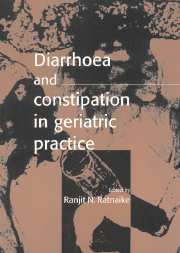Book contents
- Frontmatter
- Contents
- List of contributors
- Preface
- Acknowledgments
- Foreword by Gary R. Andrews
- I Defences of the aging gastrointestinal tract
- II Diarrhoea
- III Noninfectious clinical entities
- IV Constipation
- V Perspectives of altered bowel function
- 18 Issues of nutrition
- 19 The nursing care of older people with diarrhoea and constipation
- Index
19 - The nursing care of older people with diarrhoea and constipation
Published online by Cambridge University Press: 17 August 2009
- Frontmatter
- Contents
- List of contributors
- Preface
- Acknowledgments
- Foreword by Gary R. Andrews
- I Defences of the aging gastrointestinal tract
- II Diarrhoea
- III Noninfectious clinical entities
- IV Constipation
- V Perspectives of altered bowel function
- 18 Issues of nutrition
- 19 The nursing care of older people with diarrhoea and constipation
- Index
Summary
Introduction
The subjects of diarrhoea and constipation are often the source of hilarity. Anglo-Saxon culture has a rich tradition of ‘lavatory’ language and humour, which most people indulge in at times. It is reasonable to think, however, that one group of people who are not entertained by such humour are those people most affected by these conditions – i.e. themselves, or their carers.
Diarrhoea and constipation are often considered to be common among older people yet there is little research that addresses these and the related problems of faecal incontinence and excessive flatus. The notion that these conditions are a normal consequence of aging cannot be supported yet is widely believed in the general community.
It is unfortunate that many health care providers also hold the belief that older people are normally incontinent of faeces or, alternatively, have a ‘bowel fixation’ which leads to frequent complaints of constipation. These ideas reflect stereotypical attitudes about age and contribute to ageist prejudice that trivializes quite real concerns. This, in turn, can lead to individuals being reluctant to acknowledge that they have a problem, either from feelings of humiliation or fear of further ridicule. Norton (1994) says that the problems of diarrhoea and faecal incontinence are ‘… significantly under-reported symptoms which many … accept and disguise because of shame and embarrassment … [and that] … most people with faecal incontinence receive no professional help’.
- Type
- Chapter
- Information
- Diarrhoea and Constipation in Geriatric Practice , pp. 215 - 230Publisher: Cambridge University PressPrint publication year: 1999



